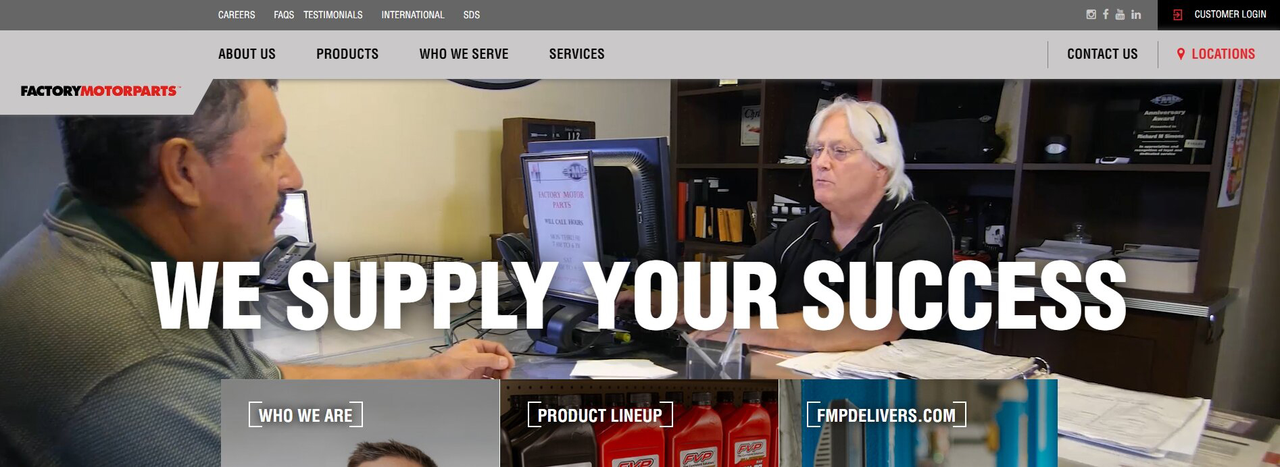In the competitive world of auto parts e-commerce, customer decisions are influenced by more than just product quality and price. For B2B auto parts suppliers, securing one-time sales is not enough—the real challenge is implementing a customer retention strategy that encourages repeat purchases and long-term partnerships.The case of Factory Motor Parts (FMP) offers valuable insights into how an independent website can enhance loyalty, trust, and overall customer experience.
Optimizing User Experience
In auto parts procurement, customers care about ease of ordering, transparency of information, and efficiency of delivery. Complex checkout processes, inaccurate stock data, or delayed shipments not only raise time costs but can also lead to operational risks.
Image: Factory Motor Parts official websiteFactory Motor Parts addresses these issues by building an integrated online ordering system. The platform combines product search, inventory lookup, order management, and checkout into a single solution. With real-time updates on stock and pricing, customers face fewer risks of placing orders only to discover items are out of stock. This seamless experience fosters reliance—once customers get used to it, they are less likely to switch providers.
Strengthening Supply Chain Support
Auto parts customers—such as repair shops and service centers—need not only quality products but also stable and timely supply. Their downstream clients often demand urgent solutions, and unstable supply chains can directly disrupt business.
Image: Factory Motor Parts official websiteTo solve this, Factory Motor Parts has set up multiple regional warehouses supported by a fast-response logistics system. Orders are dispatched from the nearest location, while a digital tracking system allows customers to monitor progress in real time. Even in emergencies, FMP can adjust flexibly to fulfill large orders. This reliability significantly boosts customers’ sense of security in the partnership.
Delivering Value Beyond Products
In today’s market, simple product transactions are no longer enough to build long-term relationships. Clients now assess whether suppliers can provide extra value that supports their growth.
Image: Factory Motor Parts official websiteFMP goes beyond supplying auto parts by offering training programs to help technicians upgrade their skills, and digital management tools that optimize inventory and service workflows. By extending services beyond products, FMP not only retains customers but also empowers them to become more competitive. From “point-to-point procurement” to “comprehensive empowerment,” customer stickiness naturally grows stronger.
Choosing the Right Independent Website Platform
Selecting the right platform is crucial for auto parts e-commerce:
- Ueeshop: Ideal for suppliers entering international markets, supports multi-language, multi-currency, and complex SKUs.
- Shopify: Popular internationally, rich app ecosystem, suitable for experienced cross-border sellers.
- WordPress + WooCommerce: Highly customizable, requires technical knowledge.
- Magento (Adobe Commerce): Supports complex B2B transactions and multi-level pricing, ideal for large enterprises.
Building Trust in B2B Auto Parts E-Commerce
Customer Reviews and Testimonials
FMP showcases authentic feedback from repair shops, tire service providers, and dealerships. Highlighting product quality and after-sales support reduces decision-making friction and accelerates trust.
Image: Factory Motor Parts official website
Corporate Social Responsibility
Buyers increasingly value sustainability and responsibility. FMP organizes charitable events—blood drives, clothing and food donations—enhancing brand image and long-term reliability.
Image: Factory Motor Parts official website
Product Recall Transparency
Safety issues are a primary concern. FMP maintains a “Safety Recall Notices” section, publicly listing affected brands and parts. This transparency strengthens trust and reinforces social responsibility.
Image: Factory Motor Parts official website
SEO and Traffic Analysis of Auto Parts Supplier Websites
According to Similarweb, most traffic to FMP’s official site comes from direct visits (58.57%), followed by organic search (35.2%) and referrals (3.84%).
Keyword Strategy
Brand-related keywords dominate FMP’s rankings, with high volume and low difficulty, consistently holding top positions. This reflects FMP’s strong brand awareness and SEO focus on consolidating brand-driven traffic. Such a strategy ensures that customers quickly find the official site, avoiding diversion to competitors or third-party platforms.
URL & Content Structure
Beyond its homepage and “About Us,” FMP optimizes functional and conversion-oriented pages like who-we-serve/wholesale-distributors and customer-login. This keyword-to-function mapping ensures search users land directly on conversion paths, reducing bounce rates.
Backlinks
FMP’s backlinks primarily come from local auto repair shops and regional service websites. While many have low domain authority, their strong relevance enhances industry trust and local search rankings. Additionally, FMP secures links from industry rankings and recommendation lists (e.g., “Top 10 Auto Parts Suppliers in the World 2025”), boosting brand authority and search engine credibility.
Conclusion: A Sustainable Customer Retention Strategy
Factory Motor Parts’ independent website strategy demonstrates how auto parts suppliers can move beyond price competition to build loyal, long-term customer relationships. By focusing on user experience, supply chain stability, value-added services, platform choice, and transparent trust-building, suppliers can transform their websites into powerful loyalty engines.
👉 Original article : https://www.cifnews.com/article/178682


